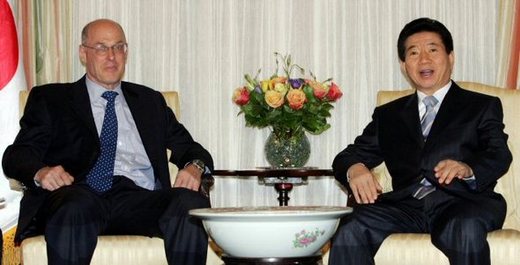 |
|
U.S. treasury secretary Henry Paulson paid a vist to Korean president Roh Moo-hyun in Washington D.C. on September 14.
|
Meanwhile, U.S. mulls how to cope with China’s military rise
The United States and China have reportedly agreed to upgrade the level of their strategic talks to the ministerial level from the previously planned vice-ministerial-level discussion. U.S. treasury secretary Henry Paulson is likely to head the U.S.-Sino strategic talks. Paulson is known as one of supporters of the current administration’s strategic approach to China. China’s Dong Fang Zao Bao reported on September 14 that Paulson will participate in a third round of U.S.-Sino strategic talks, citing the attendance of then-Deputy Secretary of State Robert Zoellick during the past two rounds in August and December last year. So far, China’s vice foreign minister Dai Bingguo has attended the talks. The third round of U.S.-Sino strategic talks had been planned to be held in the first half of this year, but were delayed when Zoellick abruptly resigned from his post. Paulson is scheduled to visit China for the first time after his inauguration sometime following his attendance at the annual meeting of the International Monetary Fund, World Bank, and G-7 finance ministers in Singapore next week.Paulson’s Chinese counterpart will likely be either deputy finance minister Jin Renqing, deputy foreign minister Li Zhaoxing, foreign minister Tang Jiaxuan, or finance minister Wu Yi. Some observers say Paulson’s changed role may be related to his meeting with South Korean President Roh Moo-hyun during Roh’s Washington visit. Paulson is in charge of imposing financial regulations against North Korea and Iran. Paulson is reportedly putting his focus on improving long-term ties with China, rather than causing short-term friction. From this point of view, Paulson is seen as a successor to Zoellick’s approach to China, who was thought of as a ’responsible stakeholder’ in the drive for a renewal of the U.S.-China relationship. Paulson is considered a rare Chinese expert among high-profile U.S. officials. During his 32-year career at Goldman Sachs, he visited China more than 70 times. In a speech at the U.S. Treasury Department on September 13, Paulson said that the U.S. hopes China succeeds, and expressed Washington’s wish to develop U.S.-Sino ties from a long-term point of view. America’s huge interest is hung on prosperous and stable China, he said, saying that the Asian nation has a will and capability to play a role as one of the world’s economic leaders. Referring to a growing call for the Chinese Yuan to be valued higher on the international currency market, Paulson emphasized a long-term, comprehensive approach to the issue. Meanwhile, the U.S. reportedly plans to develop a new post of assistant secretary in charge of Asia-Pacific affairs within its defense ministry, in order to cope with China’s growing military influence in the region. The U.S. National Security Council has split its Asia division into two - East Asia and South Asia - with Dennis Wilder in charge of East Asian affairs. The Washington Post reported that Richard Rollins, deputy assistant secretary for Asia, and Torkel Patterson, chairman of Raytheon, were likely candidates for the defense ministry’s new Asia-Pacific assistant secretary. Patterson gained support from Washington’s neoconservatives when he expressed his hard-line stance on China regarding tensions between Taipei and Beijing.





